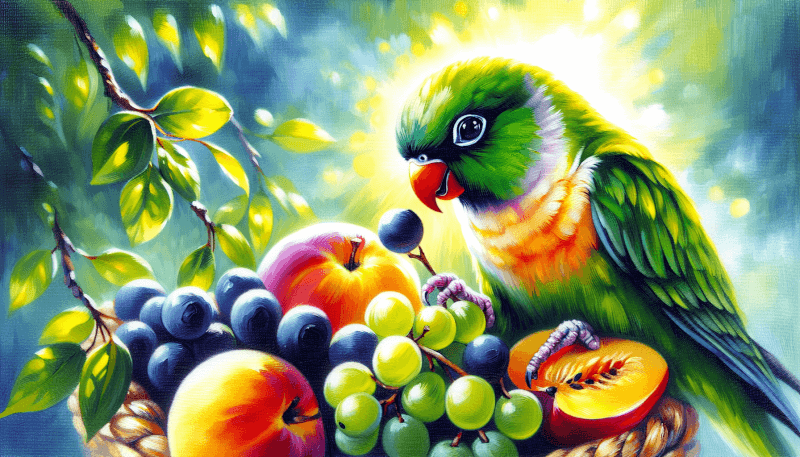In order to maintain a healthy and balanced diet for your feathered friends, it is crucial to ensure that they are getting the right amount of essential carbohydrates. Just like humans, birds need carbohydrates as a source of energy, and incorporating the appropriate ones into their diets can greatly contribute to their overall well-being. By understanding which carbohydrates are essential for avian health, you can provide your birds with the necessary nutrients for a vibrant and active life. From whole grains to fruits and vegetables, there are a variety of options available to meet their dietary needs. So, let’s dive into the world of essential carbohydrates for a healthy avian diet and discover how they can positively impact your bird’s health.
Essential Carbohydrates for a Healthy Avian Diet
Birds require a well-balanced diet to maintain their health and thrive. While proteins and fats are important, carbohydrates should not be overlooked as a vital component of their diet. Carbohydrates are a crucial source of energy and play a significant role in nutrient absorption, gut health, and weight management for birds. By understanding the different types of carbohydrates and incorporating recommended carbohydrate sources into their diet, you can ensure that your feathered friends receive the essential nutrients they need to flourish.
Benefits of Carbohydrates for Birds
- Energy Source:
Carbohydrates are an excellent source of energy for birds. They are broken down into glucose, which is easily absorbed and utilized by the body. Whether it’s for flying, foraging, or general activity, birds require ample energy to carry out their daily tasks. Carbohydrates provide the necessary fuel to keep them active and full of vitality.
- Nutrient Absorption:
Carbohydrates contribute to the absorption of other essential nutrients in a bird’s diet. When carbohydrates are consumed along with other nutrients, they help facilitate their absorption in the digestive system. Without carbohydrates, vital nutrients like vitamins and minerals may not be efficiently absorbed, leading to nutritional deficiencies.
- Gut Health:
A healthy digestive system is crucial for overall avian well-being. Carbohydrates play a vital role in maintaining gut health by promoting the growth of beneficial bacteria in the bird’s digestive tract. These beneficial bacteria aid in digestion, improve nutrient absorption, and strengthen the immune system, contributing to improved overall health.
- Weight Management:
Maintaining a healthy weight is important for birds to prevent obesity or malnourishment. Carbohydrates provide a moderate and sustained source of energy, preventing sudden spikes or drops in blood sugar levels. This helps birds maintain a healthy weight and prevents excessive fat storage or muscle loss, ensuring they stay in optimal condition.

Understanding Carbohydrates
- Definition and Types of Carbohydrates:
Carbohydrates are organic compounds made up of carbon, hydrogen, and oxygen, and they serve as a primary energy source for living organisms. There are two main types of carbohydrates: simple and complex.
- Simple Carbohydrates:
Simple carbohydrates are comprised of one or two sugar molecules. They are quickly digested and absorbed by the body, providing a rapid burst of energy. However, they are also quickly metabolized, making their effects short-lived. Examples of simple carbohydrates for birds include table sugar, honey, and fruit.
- Complex Carbohydrates:
Complex carbohydrates consist of multiple sugar molecules linked together. They take longer to digest, resulting in a slower and more sustained release of energy. Complex carbohydrates are found in whole grains, legumes, and vegetables. They offer a steady source of energy and promote satiety, making them essential for maintaining bird’s health.

Recommended Carbohydrate Sources for Birds
- Whole Grains:
Whole grains, such as oats, wheat, and barley, are an excellent source of complex carbohydrates for birds. They provide a steady release of energy, high fiber content, and essential nutrients like B vitamins and minerals. Whole grains can be offered to birds in their natural form or as part of a formulated diet.
- Fruits and Vegetables:
Fruits and vegetables are not only a good source of carbohydrates but also provide additional vitamins, minerals, and antioxidants. Birds can enjoy a variety of colorful fruits and vegetables, such as apples, oranges, carrots, and leafy greens. It’s important to offer a diverse range of fruits and vegetables to provide a wide range of nutrients in their diet.
- Legumes and Lentils:
Legumes and lentils, including peas, chickpeas, and lentils, are rich in complex carbohydrates and protein. These plant-based sources are highly nutritious and can be an important component of a bird’s diet. Soaked or cooked legumes can be offered to birds after removing any toxins or anti-nutritional factors they may contain.
- Seeds and Nuts:
Seeds and nuts, such as sunflower seeds and almonds, are a good source of both fats and carbohydrates for birds. They provide energy, essential fatty acids, and various beneficial vitamins and minerals. However, it’s important to offer them in moderation due to their high fat content. You can provide a variety of seeds and nuts or choose a formulated bird food that includes them.

Feeding Tips for Birds
- Balanced Diet:
To ensure your bird receives all the necessary nutrients, it’s crucial to provide a balanced diet that includes a variety of foods from different food groups. Along with carbohydrates, incorporate proteins, fats, vitamins, and minerals in appropriate proportions.
- Portion Control:
Controlling the portion sizes is essential to prevent overeating or undernourishment. Be mindful of the recommended serving sizes for your bird’s species and adjust accordingly. Consult with a veterinarian or avian nutritionist to determine the appropriate portion sizes for your specific bird.
- Variety:
Offer a diverse range of carbohydrate sources, as well as other food groups, to ensure a varied and nutritious diet. This helps provide a wide array of essential nutrients and prevents boredom in your bird’s feeding routine.
- Fresh and Natural Food:
Offer fresh and natural food whenever possible. Avoid processed and sugary treats as they can lead to health issues. Make sure to wash fruits and vegetables thoroughly, removing any pesticides or toxic substances before offering them to your bird.

Potential Risks and Limitations
- Obesity:
While carbohydrates are vital for energy production, excessive consumption can lead to obesity in birds. It is essential to monitor your bird’s weight and adjust the carbohydrate intake accordingly. Frequent exercise and a balanced diet can help maintain a healthy weight for your feathered friend.
- Digestive Issues:
Some birds may have difficulty digesting certain types of carbohydrates, leading to digestive issues such as bloating, diarrhea, or constipation. If you notice any abnormalities in your bird’s digestive system, consult with a veterinarian for appropriate dietary modifications.
- Allergies or Sensitivities:
Just like humans, birds can develop allergies or sensitivities to certain foods, including carbohydrates. If you observe any signs of allergic reactions such as itchiness, rashes, or respiratory problems after introducing a new carbohydrate source, discontinue its use and consult a veterinarian.
By incorporating essential carbohydrates into your bird’s diet, you will ensure they receive the necessary energy and nutrients for a healthy and thriving life. Remember to provide a balanced diet, control portion sizes, offer a variety of carbohydrate sources, and prioritize fresh and natural foods. Monitoring your bird’s weight and being mindful of potential risks and limitations will contribute to their overall well-being. With a well-planned, carbohydrate-rich diet, your feathered friend will enjoy a vibrant and energetic life!



